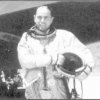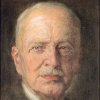Looking back at the career, Vojvodich received his pilot wings in 1950 from Nellis Air Force Base in Nevada. Six years later, he graduated from Squadron Officer School at Maxwell Air Force Base in Alabama. During 1971, he completed his studies at National War College Fort Lesley J. McNair in Washington DC.
.Vojvodich served as an F-84 pilot and aircraft commander in the early 1950's at Turner Air Force Base in Georgia. He then saw action in South Korea, flying F-80's and F-86's. He also made a 300 mile surveillance flight into China searching for, and ultimately finding, secret Soviet-made bombers.
In all, Vojvodich flew 125 combat missions. He is also one of only five initial pilots who flew the CIA's spy plane (A-12) in North Vietnam. His time spent in the air was a total of 6,000 flying hours. On May 1, 1980, Vojvodich was promoted to Major-General.
Some of his worthy military awards also include the Distinguished Service Medal, Distinguished Service Cross, Distinguished Flying Cross and the Intelligence Star for Valor presented by the CIA. He retired in March of 1983. Maj-Gen Vojvodich passed away on November 3rd, 2003 at his home in Schertz, Texas after suffering from leukemia.




